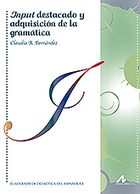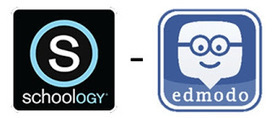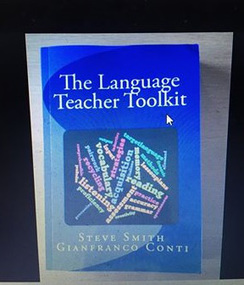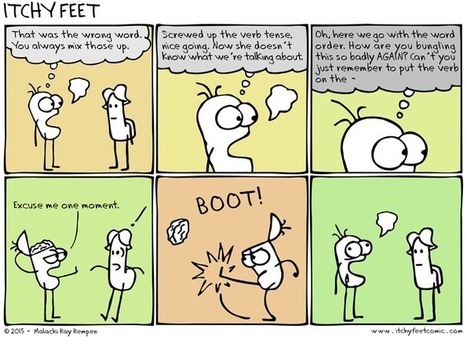 Your new post is loading...
 Your new post is loading...

|
Scooped by
Todoele
August 25, 2016 10:40 AM
|
This book explores second language (L2) learning, teaching and assessment from a comprehensible input (CI) perspective. This focus on the role of input is important for deepening our understanding of interactions between the learner, teacher and the environment as well as of the nature of the learning, teaching and assessment processes. The book takes a blended approach that promotes the intertwining of theory, research and practice in L2 pedagogy and assessment and aims to address the commonly used concept of CI and its role in L2 education. Content includes a comprehensive discussion of the conceptual foundation of CI; a multimodal and dynamic interpretation of CI from numerous perspectives; a critical discussion of well-known L2 acquisition theories and research; a practical examination of the role of multimodal forms of CI in L2 pedagogy; an analytical review of factors to be considered when modifying CI for pedagogical purposes in different settings and an overview of CI in L2 assessment. It will be of interest to students in the fields of L2 learning, teaching and assessment, teachers in second/foreign language settings and researchers of SLA and teacher education.

|
Scooped by
Todoele
August 25, 2016 10:38 AM
|
This book provides a wide-ranging and in-depth theoretical perspective on dialogue in teaching. It explores the philosophy of dialogism as a social theory of language and explains its importance in teaching and learning. Departing from the more traditional teacher-led mode of teacher–student communication, the dialogic approach is more egalitarian and focuses on the discourse exchange between the parties. Authors explore connections between dialogic pedagogy and sociocultural learning theory, and argue that dialogic interaction between teacher and learners is vital if instruction is to lead to cognitive development. The book also presents prosody as a critical resource for understanding between teachers and students, and includes some of the first empirical studies of speech prosody in classroom discourse.

|
Scooped by
Todoele
August 15, 2016 11:00 AM
|
What happens when you’re in a foreign country, trying out the language you’re learning, and you discover that the person you’re talking to is from the same country you are? Do you keep speaking the language, together but probably incorrectly? Or do you bashfully lapse into your native tongue?

|
Scooped by
Todoele
August 1, 2016 3:53 PM
|
When speaking a foreign language, especially a “famous” one like French, German or even English, it may feel patronizing to really lay on a thick local accent. But if you don’t, you might not be understood at all…

|
Scooped by
Todoele
July 18, 2016 7:01 PM
|
El papel del input en el aprendizaje de una segunda lengua es de vital importancia y a que constituye la materia prima esencial en la creación y desarrollo de un sistema lingüístico. En este libro se explica lo que es (y lo que no es) el input y cómo es percibido por los humanos. En base a esto, se discute la importancia de las intervenciones pedagógicas para que el input se destaque o se ilumine y pueda ser eventualmente integrado en el sistema lingüístico del estudiante de ELE. En particular, se presentan de manera sintetizada los principios teóricos y la evidencia empírica de cuatro técnicas de enseñanza basadas en input para la adquisición de la gramática: (1) realce del texto, (2) instrucción del procesamiento, (3) ciclos de input y output y (4) tareas de sensibilización gramatical. También se ofrecen las pautas para su desarrollo, así como ejemplos que sirven de muestra para que el docente los implemente o adapte en su práctica pedagógica.

|
Scooped by
Todoele
July 5, 2016 12:59 PM
|
Por muchos años he usado las wikis de Wikispaces con mis grupos de alumnos que estudian en la modalidad presencial en una universidad brasileña para ser futuros profesores de español. Antes, yo usaba esas wikis en su versión clásica y abierta para todos, pero en los dos últimos semestres he optado por la versión classroom (sala de aulas), que facilita en cierta medida la organización de las actividades realizadas durante el curso al imprimirle un cierto orden cronológico vertical al desorden que tienden a generar las tecnologías con flujo de comunicación predominantemente horizontal, como es este caso.

|
Scooped by
Todoele
July 1, 2016 12:20 PM
|
Includes chapters on key aspects of second language assessment such as test construct, diagnosis, exam design, and the growing range of public policy, social and ethical issues. Each of the contributors is an expert in their area; some are established names while others are talented newcomers to the field.
The chapters present new research or perspectives on traditional concerns such as test quality; fairness and bias; the testing of different language skills; the needs of different groups of examinees, including English language learners who need to take content tests in English; and the use of language assessments for gate-keeping purposes. The volume demonstrates how language assessment is informed by and engages with neighbouring areas of applied linguistics such as technology and language corpora.

|
Scooped by
Todoele
June 20, 2016 1:34 PM
|
There’s no such thing as a single language; meaning, there’s no objective object we can point to as “the German language,” or any language for that matter. It’s all in our collective heads. It’s not even like the metric system, for which there is a concrete, foundational “meter bar” and “prototype kilogram” locked up France’s International Bureau of Weights and Measures to which we can refer. Language is a fluid, organic, constantly changing beast, and there’s no “original” for any language; there’s only the accepted “standard” version.
So perhaps it’s more accurate to say that it is important to know whose language you’re learning.

|
Scooped by
Todoele
June 19, 2016 8:33 PM
|
Bringing together contributions from some of the leading experts in the field of Spanish as a Heritage Language, this volume aims to provide an in-depth understanding of current and emerging trends in research and praxis. To this end, the volume is divided into three thematic units. The first unit surveys the study of Spanish heritage speaker bilingualism from a formal/theoretical linguistic point of view. The second unit focuses on issues shaping the current state of affairs in heritage language education. Finally, the third unit maps out future lines of development within heritage language instruction. The wide topical scope within this single volume will undoubtedly provide a valuable resource for researchers, students, and professionals working in different areas of Spanish as a heritage language.

|
Scooped by
Todoele
June 19, 2016 8:30 PM
|
Here I will concern myself with nine research facts about the acquisition and teaching of L2 pronunciation and decoding skills that every modern language teacher should know and that should constitute the starting point for any teaching approach to L2-phonology instruction.

|
Scooped by
Todoele
June 18, 2016 1:08 AM
|
This book explores how complex systems theory can contribute to the understanding of classroom language learner motivation through an extended examination of one particular, situated research project. Working from the lived experience of the participants, the study describes how action research methods were used to explore the dynamic conditions operating in a foreign language classroom in Japan. The book draws attention to the highly personalised and individual, yet equally co-formed nature of classroom foreign language learning motivation and to the importance of agency and emotions in language learning. It presents an extended illustration of the applicability of complex systems theory for research design and process in SLA and its narrative approach shines light upon the evolving nature of research and role of the researcher. The study will be a valuable resource for practitioners, researchers and postgraduate students interested in classroom language teaching and learning, especially those with a focus on motivation among learners.

|
Scooped by
Todoele
June 5, 2016 12:19 PM
|
Esta obra es una introducción a la corriente conocida como Ligüística Cognitiva que destaca que el lenguaje está basado en nuestras facultades cognitivas generales, como la percepción o la categorización, y que su estructura y funcionamiento es un reflejo de nuestra experiencia con el mundo. Ofrece una panorámica amplia, comprehensiva y actualizada de los principales desarrollos teóricos y metodológicos de esta disciplina desde su nacimiento hasta nuestros días.

|
Scooped by
Todoele
May 29, 2016 12:31 PM
|
Here is the fifth and final post in the series about learning strategies. We look at a few revision strategies and make some general concluding remarks.
|

|
Scooped by
Todoele
August 25, 2016 10:40 AM
|
The aging of the population and the increasing number of older adults pursuing foreign language courses call for a greater understanding of the ways in which these individuals learn foreign languages. This book offers a pioneering contribution to the literature on foreign language education for older adults (aged 60 and over), termed foreign language geragogy. It details an empirical, multidisciplinary study on Japanese older learners of Spanish and focuses on the influence of learning experiences on vocabulary learning strategy use. It discusses the constraints that preconceptions impose on learners, researchers, instructors and administrators, and it offers a set of practical recommendations for foreign language activities for elderly individuals. It also introduces the notion of ‘learner re-training’, an instructional mechanism that contributes to older learners' self-acknowledgment and autonomy development in foreign language learning. The book is directed at teachers and trainee teachers of foreign languages to older adults, and also at education professionals and researchers in the field of foreign language learning in general.

|
Scooped by
Todoele
August 18, 2016 6:43 PM
|
Bringing together contributions from some of the leading experts in the field of Spanish as a Heritage Language, this volume aims to provide an in-depth understanding of current and emerging trends in research and praxis. To this end, the volume is divided into three thematic units. The first unit surveys the study of Spanish heritage speaker bilingualism from a formal/theoretical linguistic point of view. The second unit focuses on issues shaping the current state of affairs in heritage language education. Finally, the third unit maps out future lines of development within heritage language instruction. The wide topical scope within this single volume will undoubtedly provide a valuable resource for researchers, students, and professionals working in different areas of Spanish as a heritage language.

|
Scooped by
Todoele
August 2, 2016 2:16 PM
|
Bringing together contributions from some of the leading experts in the field of Spanish as a Heritage Language, this volume aims to provide an in-depth understanding of current and emerging trends in research and praxis. To this end, the volume is divided into three thematic units. The first unit surveys the study of Spanish heritage speaker bilingualism from a formal/theoretical linguistic point of view. The second unit focuses on issues shaping the current state of affairs in heritage language education. Finally, the third unit maps out future lines of development within heritage language instruction. The wide topical scope within this single volume will undoubtedly provide a valuable resource for researchers, students, and professionals working in different areas of Spanish as a heritage language.

|
Scooped by
Todoele
July 19, 2016 6:17 PM
|
El fenómeno de la globalización –entendido como el conjunto de tendencias y dinámicas económicas, sociales y culturales que tienden a reducir las distancias entre el Norte y el Sur, el Este y el Oeste de nuestro planeta– lleva ya más de una década afectando nuestras vidas y es indudable que ha tenido muchos efectos positivos sobre nuestros quehaceres cotidianos. Entre dichos efectos, uno delos más emblemáticos está estrechamente relacionado con el plano de la comunicación. En efecto, la globalización ha impuesto nuevos modelos y patrones de comunicación e interacción entre los seres humanos y muchas de las cosas que conseguimos hacer hoy en día dándole a un ratón, hubieran resultado imposibles hace una o dos décadas. Este cambio de paradigma es hoy en día una realidad y nos ha empujado –como seres humanos– a volver a plantearnos los conceptos de comunicación e interacción, especialmente al enfrentarnos a la “otredad”, esto es, a códigos lingüísticos y culturales distintos a los nuestros. Al hilo de lo anterior, este volumen se plantea una reflexión teórico-práctica en torno al concepto de mediación lingüística y pretende aportar algunas orientaciones metodológicas a la hora de llevar la mediación al aula de lenguas extranjeras.

|
Scooped by
Todoele
July 11, 2016 1:51 PM
|
Do you ever feel like your brain is getting in the way of your language learning? You're not the only one.

|
Scooped by
Todoele
July 4, 2016 10:07 AM
|
I recently gave a talk on Open Educational Resources for Teachers of Foreign Languages (focus on Spanish). You can find the slides here.

|
Scooped by
Todoele
June 23, 2016 11:48 PM
|
Ponencia del VII Seminario de Formación de Profesores de español como lengua extranjera de Sarajevo. Colección de 6 warmers para activar una clase de ELE

|
Scooped by
Todoele
June 19, 2016 8:35 PM
|
My Spanish 4 classes have been acquiring Spanish with comprehensible input methods all along, and they are GOOD. They are PROFICIENT. And guess what? We are not done. Just as I myself continue flooding my own free time with target language to increase/maintain my proficiency, they need a constant push to acquire more. However, they can communicate! And they enjoy using their acquired language to communicate. It is fun and satisfying! Output has a role and to me, this is it!

|
Scooped by
Todoele
June 19, 2016 8:32 PM
|
Do your grades paint a picture of the language your students have developed this year? Do they communicate how well they followed directions? Perhaps this is something that you haven’t thought about. As an administrator and working with many principals I can tell you it is an important distinction. Now or as school closes is the time to reflect over the year and the messages we send on the permanent records of our students to advocate for or against language learning. I say it like a broken record, every day in our classrooms we send messages to kids about who they are as language learners. Grades, send the biggest, loudest message. So what do they say?

|
Scooped by
Todoele
June 19, 2016 8:26 PM
|
My Spanish 3 students ended the year with Lit Circles, and I used Allison Wienhold’s (twitter: @SraWienhold; blog: misclaseslocas.blogspot.com) idea to let them choose from a list of projects to show me what they learned at the end. One student came up with the idea of musical chairs and the more he talked about it, the more and more I liked the idea!

|
Scooped by
Todoele
June 17, 2016 3:51 PM
|

|
Scooped by
Todoele
May 29, 2016 7:42 PM
|
This study focused on teachers' reasoning about the use of technology in practice. Both teachers' professional reasoning and their technology use were investigated. Through video cases, 157 teachers demonstrated their technology use in practice and commented on the reasoning behind their actions. Results show that most technology use was intended to strengthen both pedagogy and subject matter, or else pedagogy alone. Reasons addressed making learning attractive for students, realising educational goals and facilitating the learning process. The majority of teachers' technology use in practice shows aspects of the knowledge transfer model of teaching. Most technology tools were used to support a learning activity; the use of technology was essential in only a few video cases. About half of the video cases showed alignment between reasoning and practice. The results contribute to better understanding of how teachers reason professionally about their technology use.
|

 Your new post is loading...
Your new post is loading...
 Your new post is loading...
Your new post is loading...






























